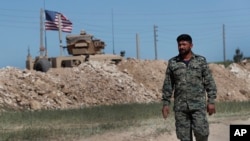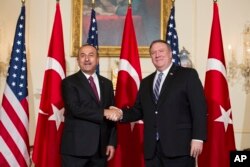The dominant U.S-backed Syrian Kurdish party that controls large swaths of oil-rich territory in northeastern Syria is prepared to hold talks with the Damascus government over the future of the area, a senior Kurdish official said Wednesday.
The proposition came a day after Turkey and the United States agreed on a ``roadmap'' to resolve a dispute over the northern Syrian town of Manbij, which is controlled by the U.S.-backed Kurdish fighters, Washington's main ally in Syria.
"The aim would... be to develop a Syrian-Syrian solution and close the door on conflicts and wars,'' said Aldar Khalil, a senior Kurdish official said.
Another Kurdish official suggested time may be ripe for dialogue with the Syrian government, which has opposed the Turkey-U.S. deal on Manbij. A previous round of talks between the Syrian Kurds and Damascus, sponsored by Russia, yielded no results.
"We are seeking... a vision that ends the war,'' said Ilham Ahmed, who co-chairs the U.S-backed Syrian Democratic Council. "We want to secure our [self-administration] project and the Americans care for that too.''
There was no immediate response from Damascus to the Kurdish comments.
Syrian President Bashar Assad's government has oscillated between reaching out to the Kurds and lashing out at them for collaborating with the Americans. Last year, the Syrian foreign minister said self-administration for the Kurds is "negotiable."
Damascus has also sharply criticized a Turkey-backed offensive against a Syrian Kurdish enclave in northwestern Syria, and left roads open for the movement of aid and people out of the Kurdish enclave.
Meanwhile, Turkey has been pushing Washington to get Syrian Kurdish militiamen out of the town of Manbij and across the Euphrates River to its eastern bank. Ankara sees the Syrian Kurdish militia and its political body as an extension of its own Kurdish insurgents, whom it considers terrorists.
On Wednesday, Turkish Prime Minister Binali Yildirim said with the Manbij deal, Ankara would have successfully "completely eliminated terror" from a 250 kilometer-long (155 miles) border area stretching from west of the Euphrates all the way to the Mediterranean.
The roadmap envisions joint Turkish-U.S. patrols around Manbij after the Kurdish militia withdraws from the town. But the deal, which could ease tensions between the NATO allies, is likely to force a realignment of troops along the volatile Syria-Turkey frontier and shrink the area controlled currently by the Kurdish-led Syrian Democratic Forces, backed by the U.S.
A Kurdish official in Manbij, Shervan Darwish, confirmed that some militia members will begin withdrawing from the town but did not mention any changes to the local military council. Turkish officials said a new council would be set up as part of the deal, within six months.
The U.S. and Turkey have differed over their description of what the Manbij deal entails and how it would be carried out, illustrating its fragility.
Khalil, the senior Kurdish official, said his party is ready to send a delegation to "test the waters" to see whether Assad's government is ready to accept an autonomous Kurdish area in the northeast.
"If the result is peace and stability, then it is in the interest of all," Khalil said in a series of messages on a social media application.





